Module 11 Body language 模块测试题(含答案)
文档属性
| 名称 | Module 11 Body language 模块测试题(含答案) |
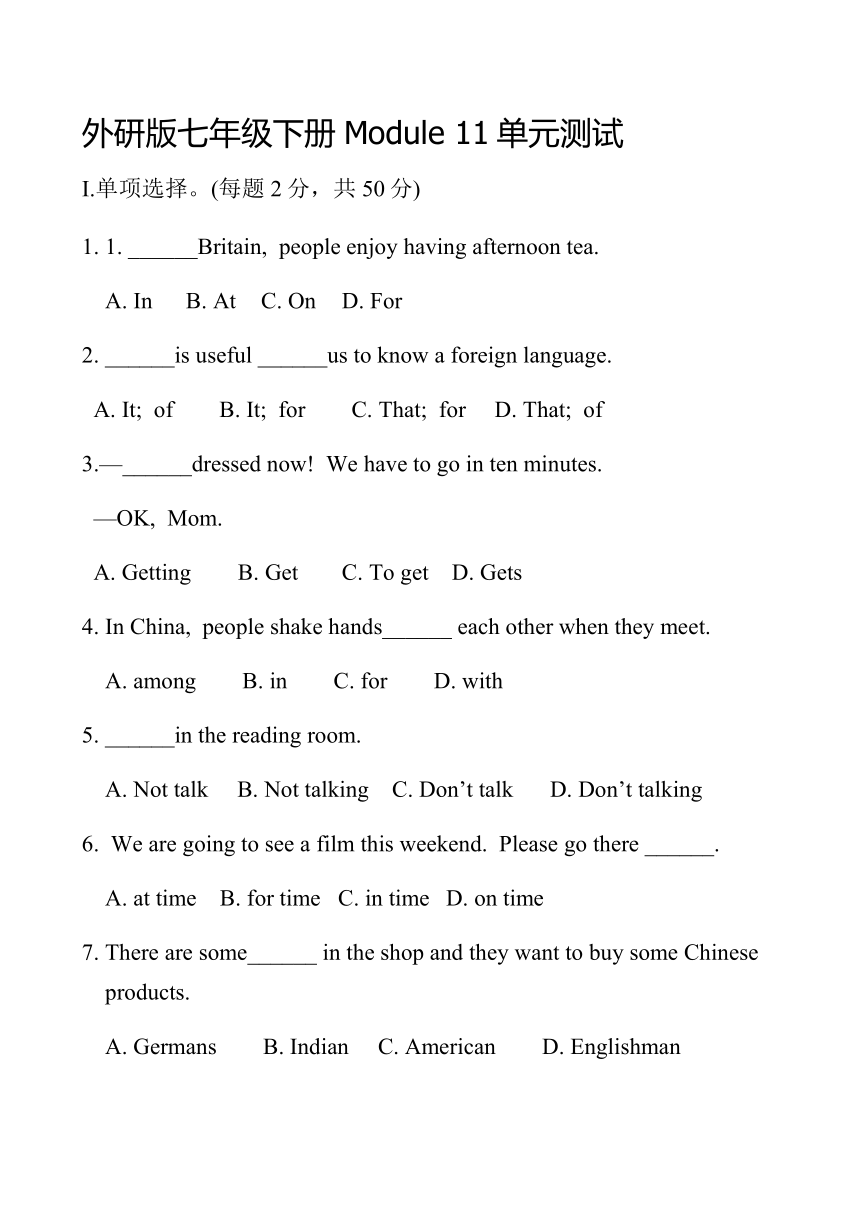
|
|
| 格式 | zip | ||
| 文件大小 | 47.5KB | ||
| 资源类型 | 教案 | ||
| 版本资源 | 外研版 | ||
| 科目 | 英语 | ||
| 更新时间 | 2019-12-11 00:00:00 | ||
图片预览

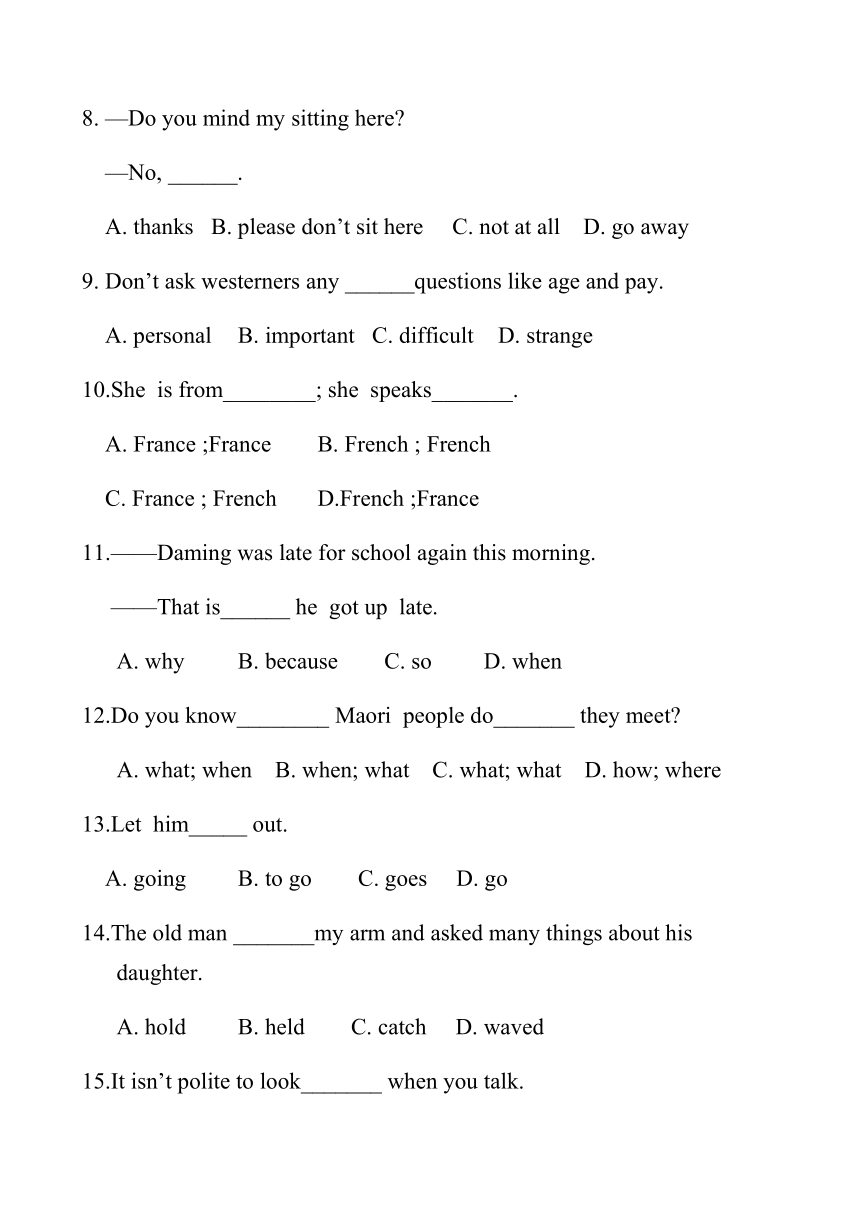
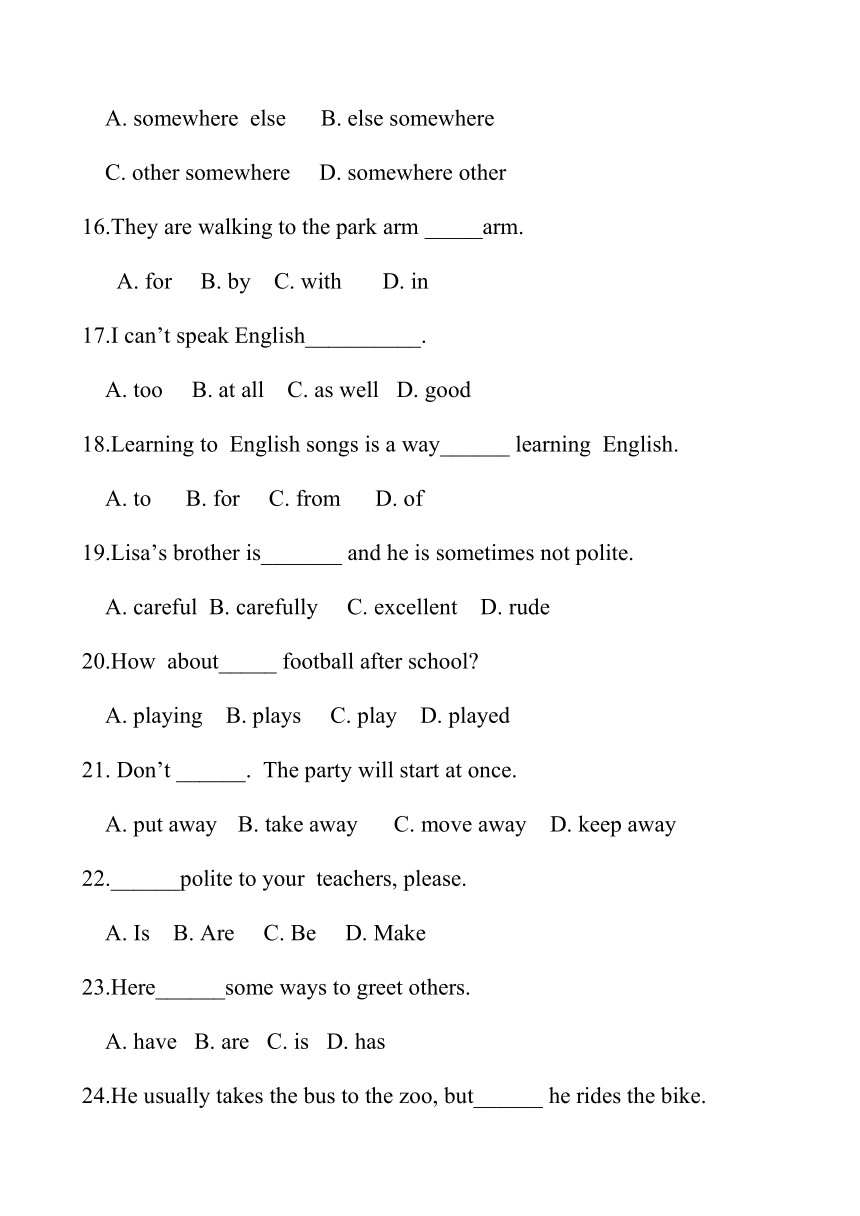
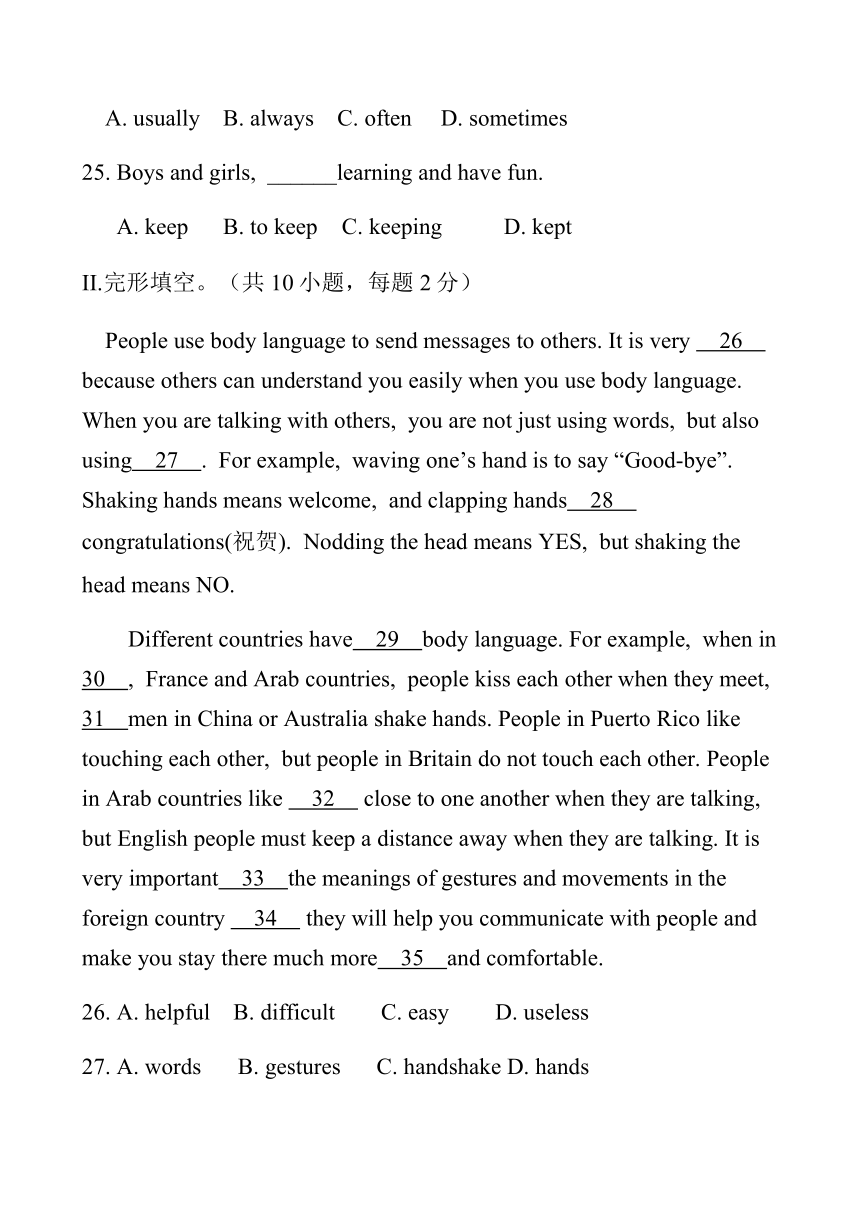
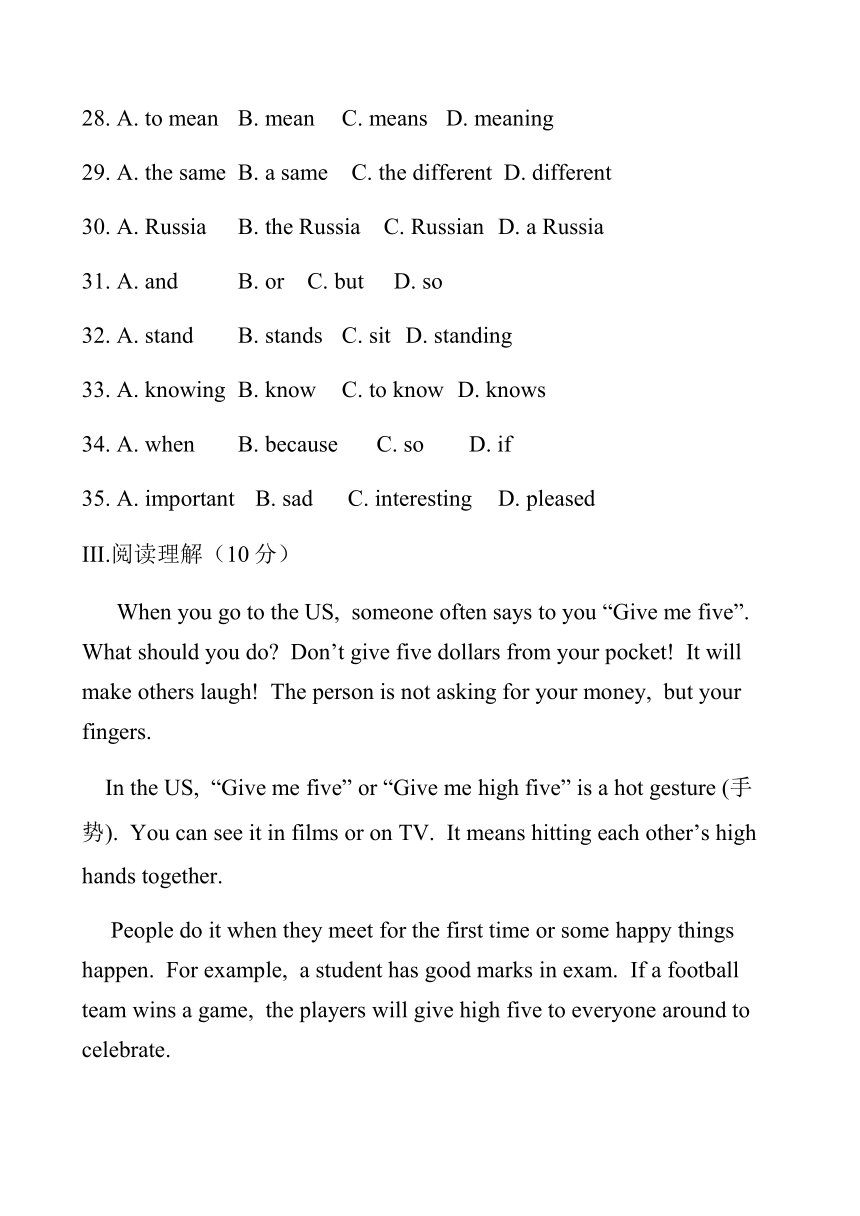
文档简介
外研版七年级下册Module 11单元测试
I.单项选择。(每题2分,共50分)
1. 1. ______Britain, people enjoy having afternoon tea. ?
A. In B. At C. On D. For
2. ______is useful ______us to know a foreign language. ?
A. It; of B. It; for C. That; for D. That; of
3.—______dressed now! We have to go in ten minutes. ?
—OK, Mom.
A. Getting B. Get C. To get D. Gets
4. In China, people shake hands______ each other when they meet. ?
A. among B. in C. for D. with
5. ______in the reading room. ?
A. Not talk B. Not talking C. Don’t talk D. Don’t talking
6. We are going to see a film this weekend. Please go there ______. ?
A. at time B. for time C. in time D. on time
7. There are some______ in the shop and they want to buy some Chinese products. ?
A. Germans B. Indian C. American D. Englishman
8. —Do you mind my sitting here?
—No, ______. ?
A. thanks B. please don’t sit here C. not at all D. go away
9. Don’t ask westerners any ______questions like age and pay. ?
A. personal B. important C. difficult D. strange
10.She is from________; she speaks_______.
A. France?;France B. French?; French?
C. France?; French D.French?;France
11.——Daming was late for school again this morning.
——That is______ he got up late.
A. why B. because C. so D. when
12.Do you know________ Maori people do_______ they meet?
A. what; when B. when; what C. what; what D. how; where
13.Let him_____ out.
A. going B. to go C. goes D. go
14.The old man _______my arm and asked many things about his daughter.
A. hold B. held C. catch D. waved
15.It isn’t polite to look_______ when you talk.
A. somewhere else B. else somewhere
C. other somewhere D. somewhere other
16.They are walking to the park arm _____arm.
A. for B. by C. with D. in
17.I can’t speak English__________.
A. too B. at all C. as well D. good
18.Learning to English songs is a way______ learning English.
A. to B. for C. from D. of
19.Lisa’s brother is_______ and he is sometimes not polite.
A. careful B. carefully C. excellent D. rude
20.How about_____ football after school?
A. playing B. plays C. play D. played
21. Don’t ______. The party will start at once. ?
A. put away B. take away C. move away D. keep away
22.______polite to your teachers, please.
A. Is B. Are C. Be D. Make
23.Here______some ways to greet others.
A. have B. are C. is D. has
24.He usually takes the bus to the zoo, but______ he rides the bike.
A. usually B. always C. often D. sometimes
25. Boys and girls, ______learning and have fun. ?
A. keep B. to keep C. keeping D. kept
II.完形填空。(共10小题,每题2分)
People use body language to send messages to others. It is very 26 because others can understand you easily when you use body language. When you are talking with others, you are not just using words, but also using 27 . For example, waving one’s hand is to say “Good-bye”. Shaking hands means welcome, and clapping hands 28 congratulations(祝贺). Nodding the head means YES, but shaking the head means NO. ?
Different countries have 29 body language. For example, when in 30 , France and Arab countries, people kiss each other when they meet, 31 men in China or Australia shake hands. People in Puerto Rico like touching each other, but people in Britain do not touch each other. People in Arab countries like 32 close to one another when they are talking, but English people must keep a distance away when they are talking. It is very important 33 the meanings of gestures and movements in the foreign country 34 they will help you communicate with people and make you stay there much more 35 and comfortable. ?
26. A. helpful B. difficult C. easy D. useless
27. A. words B. gestures C. handshake D. hands
28. A. to mean B. mean C. means D. meaning
29. A. the same B. a same C. the different D. different
30. A. Russia B. the Russia C. Russian D. a Russia
31. A. and B. or C. but D. so
32. A. stand B. stands C. sit D. standing
33. A. knowing B. know C. to know D. knows
34. A. when B. because C. so D. if
35. A. important B. sad C. interesting D. pleased
III.阅读理解(10分)
When you go to the US, someone often says to you “Give me five”. What should you do? Don’t give five dollars from your pocket! It will make others laugh! The person is not asking for your money, but your fingers.
In the US, “Give me five” or “Give me high five” is a hot gesture (手势). You can see it in films or on TV. It means hitting each other’s high hands together.
People do it when they meet for the first time or some happy things happen. For example, a student has good marks in exam. If a football team wins a game, the players will give high five to everyone around to celebrate.
This gesture may come from the old Roman gesture of raising the right arm for the king. This showed the person raising his arm didn’t have a sword (剑) in his hand.
Why not try to give the high five to your friends?
36. You need to use your ______to make the gesture “Give me five”. ?
A. legs B. arms C. heads D. hands
37. Why do people make the gesture “Give me five”?
A. to make people laugh B. to ask for money
C. to say hello to others D. to ask for help
38. When you ______, you can give your friends high fives. ?
A. lose your money B. win a football game
C. start your lessons D. find a difficult word
39. Where may the gesture start according to the passage?
A. Old Rome. B. America. C. China. D. Japan.
40. What did the Romans raise their right arms to others for?
A. They were afraid of the king.
B. They were happy to see the king.
C. They wanted to give the king a welcome.
D. They wanted to show there were no swords in their hands.
班别_________姓名_________座号________分数________
1 2 3 4 5 6 7 8 9 10
11 12 13 14 15 16 17 18 19 20
21 22 23 24 25 26 27 28 29 30
31 32 33 34 35 36 37 38 39 40
IV.单词拼写。(每小题1分,共10分)
41. Many ________(游客) came to the Great Wall and took photos.
42.There are four___________(外国的)teachers in our school.
43.It has no hands or________(脚).
44.Please write down your_________(个人的)information.
45.We have ten_________(手指).
46.Could you please_________(移动) your bike?
47.The elephant is from_______(印度).
48.The two old friends______(拥抱)each other when they met twenty years later.
49. Mary stood up and ________(握) hands with the manager.
50.It’s too cold here. Let’s go ________(某处) warm.
V.按要求完成句子。(每小题1分,共5分)
51.They’re Russian workers.(改为同义句)
The workers are ________ _________.
52. You can’t be late for school again. (改为祈使句)
________ _______ late for school again
53. Here are some ways of welcoming people. (改为同义句)
Here are some ways ________ ________ people.
54.You can say goodbye by waving hands.(就划线部分提问)
________ _________you say goodbye?
55.They nodded their heads when they met each other.(改为否定句)
They_________ ________ their heads when they met each other.
VI.短文填空。(每小题1分,共10分)
Last weekend,we____56__ ourselves.In the morning, we__57_up
very early and ate___ 58__very quickly. we ___59__a bus to
the centre of the city. We __60__the museum and I bought some
books __61__my brother. Next, we __62_to the supermarket to
buy some clothes and some food. Then ,I sent a letter to my pen friend in a ___63__office.Finally,we felt ___64__and had __65_in a restaurant.
56._______ 57. ________ 58. ________59. ________60. ________
61._______ 62. ________ 63. _______ 64. ________65. ________
VII.书面表达。(15分)
家有家规,校有校规。请以“School Rules”为题,向新生Mary介绍你们学校的一些规章制度。要求:60词左右,条理清楚,意思连贯,语句通顺,语法正确,书写规范。
提示:1.上课不能迟到;
2.教室要保持(keep)干净和安静(quiet);
3.见到老师要问好;
4.不允许在教室里吃东西;
5.不许在课堂上听音乐、玩游戏。
School Rules
Welcome to our school, Mary. Here are some of our school rules.
_____________________________________________________________________________________________________________________________________________________________________________________________________________________________________________________________________________________________________________________________________________________________________________________________________________________________________________________________________________________________________________________________________________________________________________________________________________________________________________________________________________________________________________________________________________
Module 11单元测试答案
I.单项选择。(每题2分,共80分)
1-5.ABBDC 6-10.DACAC 11-15.BADBA 16-20.DBDDA
21-25.CCBDA 26-30.ABCDA 31-35.CDCBD 36-40.DCBAD
IV.单词拼写。(每小题1分,共10分)
41. visitors 42.foreign 43.feet 44.personal 45.fingers 46.move 47.India 48.hugged 49.shook 50.somewhere
V.按要求完成句子。(每小题1分,共5分)
51.from Russia 52.Don’t be 53.to welcome 54.How do 55.didn’t nod
VI.短文填空。(每小题1分,共10分)
56.enjoyed 57.got 58.breakfast 59.took 60.visited
61.for 62.went 63.post 64.hungry 65.lunch
VII.书面表达。(15分)
School Rules
Welcome to our school, Mary.Here are some of our school rules.
We can’t be late for class. We can’t talk loudly in class. We have to be quiet in class, and we have to keep our classroom clean. When we meet the teacher, we must say hello to them. We can’t eat or drink in the classroom. But we can eat outside. We can’t listen to music or play games in class.
同课章节目录
- Module 1 Lost and found
- Unit 1 Whose bag is this?
- Unit 2 Are they yours?
- Unit 3 Language in use
- Module 2 What can you do ?
- Unit 1 I can play the piano
- Unit 2 I can run really fast
- Unit 3 Language in use
- Module 3 Making plans
- Unit 1 What are you going to do at the weekends?
- Unit 2 We're going to cheer the players.
- Unit 3 Language in use
- Module 4 Life in the future
- Unit 1 Everyone will study at home
- Unit 2 Every family will have a small plane.
- Unit 3 Language in use
- Module 5 Shopping
- Unit 1 What can I do for you?
- Unit 2 You can buy everything on the Internet
- Unit 3 Language in use
- Module 6 Around town
- Unit 1 Could you tell me how to get to the Nationa
- Unit 2 The London Eye is on your right.
- Unit 3 Language in use
- Revision module A
- Module 7 My past life
- Unit 1 I was born in a small village.
- Unit 2 I was born in Quincy.
- Unit 3 Language in use
- Module 8 Story time
- Unit 1 Once upon a time….
- Unit 2 Goldilocks hurried out of the house.
- Unit 3 Language in use
- Module 9 Life history
- Unit 1 He left school and began work at the age of
- Unit 2 He decided to be an actor.
- Unit 3 Language in use
- Module 10 A holiday journey
- Unit 1 What did you do?
- Unit 2 This morning we took a walk.
- Unit 3 Language in use
- Module 11 Body language
- Unit 1 They touch noses!
- Unit 2 Here are some ways to welcome them.
- Unit 3 Language in use
- Module 12 Western music
- Unit 1 It's so beautiful!
- Unit 2 Vienna is the centre of European classical
- Unit 3 Language in use
- Revision module B
